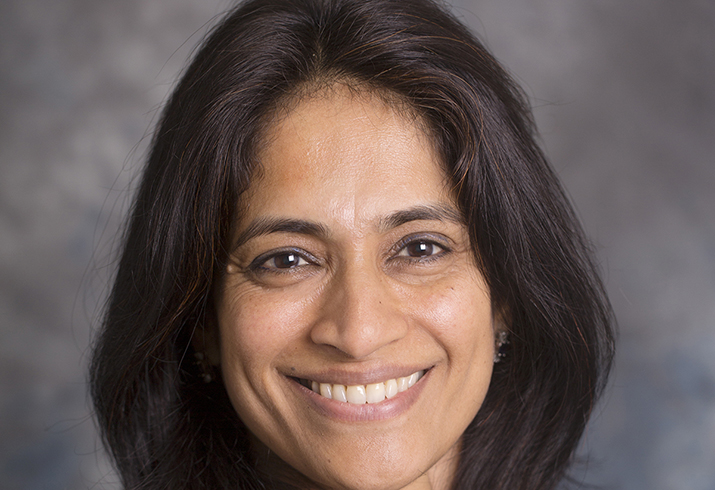Three questions with Dr Vinutha Shetty

Dr Vinutha Shetty is an endocrinology consultant at Perth Children’s Hospital (PCH) and lead of the adolescent service within the Endocrinology Department.
She is a clinical lecturer with University of WA, a clinical researcher with Telethon Kids Institute and leads the exercise research theme at the Children’s Diabetes Centre, a clinical research team integrated across PCH and the Institute. She has won multiple awards and grants, has published many peer reviewed papers and presented in both national and international conferences included invited speaker engagements.
A love of competitive sport in her youth fuelled her interest in exercise research for children and adolescents with type 1 diabetes (T1D) combined with concern around the barriers they faced to exercise. Her recently completed PhD is a series of studies focussing on glucose requirements to prevent hypoglycaemia during exercise of different intensities. The impact of her studies has been recognised by being incorporated into the current 2018 International Society for Paediatric and Adolescent Diabetes exercise guidelines which are routinely used globally by health care professionals to advice on exercise management strategies for T1D. She has been instrumental in developing a unique digital solution in the form of exercise app, “acT1ve”, for young people with T1D. The app was co-designed by Dr Shetty and the exercise research team, in collaboration with the young people with T1D. The app provides tailored advice specifically for young people living with T1D to exercise safely. The app was initially tested by a small group of young people with T1D to gauge their thoughts on acT1ve and delivered promising results. Dr Shetty and her team are midway through the clinical trial of acT1ve – a necessary step before the app can be approved for general use.
Dr Shetty is also developing a ‘Teaching Kitchens’ project to empower adolescents with T1D in managing their diabetes. Teaching Kitchens” will lay the foundation for the development of behavioural change as an intervention to improve outcomes for adolescents with T1D by teaching cooking skills, mindful eating, exercise tips and enhancing self-care behaviour.
We posed three questions to Dr Shetty about her research work.
Why are you passionate about research?
My goal in life generally is to make a difference to every individual wherever possible but especially for our patients. Research gives me a good platform to make a difference and help better manage our patients every day. I also have an interest for increasing and creation of new knowledge which motivates me to do research. I’m passionate because I’m always asking ‘why’ and research is a great way of trying to find answers. It makes me think of new ideas, new possibilities and better ways of managing our patients.
It also gives you a great opportunity to work with like-minded people who are equally committed and driven. Every member of our team is passionate about our work and wants to make a difference to our patients through translational research. In many areas research translation can take a long time but we hope our project can be much faster once we have results from our clinical trial.
What research achievement are you proudest of?
The feedback that we got from our focus groups with young people with T1D highlighted that exercising safely was one of the biggest challenges they faced in managing diabetes and that’s where we got the idea of developing an exercise app. I am enormously proud of the exercise app I developed with my research team within the Children’s Diabetes Centre, particularly the enormous work required to develop the algorithm. The algorithm has 240 pathways which accounts for so many variables in exercise including type, intensity and duration of activity in addition to the time when the activity is performed and the glucose levels during activity. Based on all these factors, the app provides tailored carbohydrate and insulin advice during exercise. It was really satisfying and exciting to analyse the results from the pilot trial. Those results demonstrated the app made it easier for our participants to exercise and gave them more confidence. It confirmed we were on the right track. Our trial participants didn’t want to give back the app because they found it so beneficial. The whole point of developing the app is to get young people who are reluctant to exercise to start exercising and build confidence and we hope that by preventing low blood glucose levels, this app will encourage them to be physically active more frequently and gain the many benefits of exercise.
I want our patients to have the same opportunities in life as any other child and to reduce their anxiety around the impact on their glucose levels from exercise and the fears of triggering a low (hypoglycaemia). They should be able to enjoy physical activity without feeling any different. We all want our patients to have a good quality of life and a normal, healthy lifestyle.
It is very satisfying to know that my work is having such a positive impact.
What advice would you give to your younger self?
It’s a privilege to be a healthcare professional but I’ve only started questioning everything in the last decade. I regret not starting that sooner because I’m short of time to do everything I want to do.
I wish I had started this journey much earlier because it has been so satisfying.

